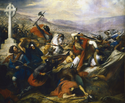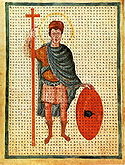| This article needs additional citations for verification. Please help improve this article by adding citations to reliable sources. Unsourced material may be challenged and removed. Find sources: "Pepin of Herstal" – news · newspapers · books · scholar · JSTOR (October 2017) (Learn how and when to remove this message) |
| Pepin of Herstal | |
|---|---|
| Duke and Prince of the Franks | |
| Reign | 687 – 714 |
| Successor | Charles Martel |
| Mayor of the Palace of Austrasia | |
| Reign | 680 – 714 |
| Predecessor | Wulfoald |
| Successor | Theudoald |
| Mayor of the Palace of Neustria | |
| Reign | 687 – 695 |
| Predecessor | Berchar |
| Successor | Grimoald |
| Mayor of the Palace of Burgundy | |
| Reign | 687 – 695 |
| Predecessor | Position reestablished |
| Successor | Drogo |
| Born | 635 |
| Died | 16 December 714 Jupille, Austrasia |
| Burial | Basilique Notre-Dame de Chèvremont, Liège |
| Spouse | Plectrude Alpaida (mistress) |
| Issue | Grimoald the Younger Drogo of Champagne Charles Martel Childebrand |
| House | Arnulfings Pippinids (maternal) |
| Father | Ansegisel |
| Mother | Begga |
| Carolingian dynasty |
|---|
 |
Pippinids
|
Arnulfings
|
Carolingians
|
After the Treaty of Verdun (843)
|

Pepin II (c. 635 – 16 December 714), commonly known as Pepin of Herstal, was a Frankish statesman and military leader who de facto ruled Francia as the Mayor of the Palace from 680 until his death. He took the title Duke and Prince of the Franks upon his conquest of all the Frankish realms.
The son of the powerful Frankish statesman Ansegisel, Pepin worked to establish his family, the Pippinids, as the strongest in Francia. He became Mayor of the Palace in Austrasia in 680. Pepin subsequently embarked on several wars to expand his power. He united all the Frankish realms by the conquests of Neustria and Burgundy in 687. In foreign conflicts, Pepin increased the power of the Franks by his subjugation of the Alemanni, the Frisians, and the Franconians. He also began the process of evangelisation in Germany.
Pepin's statesmanship was notable for the further decrease of Merovingian royal authority, and for the acceptance of his family's undisputed right to rule. Therefore, Pepin was able to name as heir his grandson Theudoald. But this was not accepted by his powerful son Charles Martel, leading to a civil war after his death in which the latter emerged victorious.
Background
Pepin, sometimes called Pepin II and Pepin the Middle, was the grandson and namesake of Pepin I the Elder through the marriage of Pepin I's daughter Begga to Ansegisel. He was also the grandfather of Pepin the Short and great-grandfather of Charlemagne. That marriage united the two houses of the Pippinids and the Arnulfings which created what would be called the Carolingian dynasty. Pepin II was probably born in Herstal (Héristal), modern Belgium (where his centre of power lay), whence his byname (sometimes "of Heristal").
Rise to power
As mayor of Austrasia, Pepin and Martin, the duke of Laon, fought the Neustrian mayor Ebroin, who had designs on all Francia. Ebroin defeated the Austrasians in the Battle of Lucofao and came close to uniting all the Franks under his rule; however, he was assassinated in 681, the victim of a combined attack by his numerous enemies Pepin immediately made peace with his successor, Waratton.
However, Waratton's successor, Berchar, and the Neustrian king Theuderic III, who, since 679, was nominal king of all the Franks, made war on Austrasia. The king and his mayor were decisively defeated at the Battle of Tertry (Textrice) in the Vermandois in 687. Berchar and Theuderic withdrew themselves to Paris, where Pepin followed and eventually forced on them a peace treaty with the condition that Berchar leave his office. Pepin was created mayor in all three Frankish kingdoms (Austrasia, Neustria, and Burgundy) and began calling himself Duke and Prince of the Franks (dux et princeps Francorum). In the ensuing quarrels, Berchar killed his mother-in-law Ansfled and fled. His wife Anstrude married Pepin's eldest son Drogo, Duke of Champagne, and Pepin's place in Neustria was secured.
Duke and Prince of the Franks
The Neustrians barely tolerated an Austrasian overlord, but Pepin preferred to put these local resistances aside to deal with Germany. Over the next several years, Pepin subdued the Alemanni, Frisians, and Franconians, bringing them within the Frankish sphere of influence. Between 690 and 692, Utrecht fell. This gave the Franks control of important trade routes on the Rhine to the North Sea. He also supported the missionary work of Willibrord. In 695, he placed Drogo in the Burgundian mayorship and his other son, Grimoald, in the Neustrian one.
Around 670, Pepin had married Plectrude, who had inherited substantial estates in the Moselle region. She was the mother of Drogo of Champagne and Grimoald II, both of whom died before their father. However, Pepin also had a mistress (or possibly, a second wife) named Alpaida (or Chalpaida) who bore him two more sons: Charles Martel and Childebrand.
Marriage and Children
Pepin married Plectrude and had two children:
Pepin had one son to an unnamed mistress:
Pepin had one son to Alpaida:
Death and succession
Just before Pepin's death, Plectrude convinced him to disinherit the sons he had with his mistress Alpaida in favour of his grandson, Theudoald (the son of Pepin and Plectrude's son Grimoald), who was still a young child (and amenable to Plectrude's control). Pepin died suddenly at the age of 79 on 16 December 714, at Jupille (in modern Belgium). His grandchildren through Plectrude claimed themselves to be Pepin's true successors and, with the help of Plectrude, tried to maintain the position of mayor of the palace after Pepin's death. However, Charles (son of Pepin and Alpaida) had gained favour among the Austrasians, primarily for his military prowess and ability to keep them well supplied with booty from his conquests. Despite the efforts of Plectrude to silence her child's rival by imprisoning him, he became the sole mayor of the palace—and de facto ruler of Francia—after a civil war which lasted for more than three years after Pepin's death.
Cultural uses
In 2018, the Dutch production company Farmhouse released a movie called Redbad (film), based on the historical Redbad and directed by Roel Reiné. Jonathan Banks played Pepin of Herstal, who is the main villain in this movie.
References
- "Vita Sanctae Geretrudis (The Life of Saint Geretrud) and the Additamentum Nivialense de Fuilano (the Nivelles supplement to the Vita Fursei concerning Foillan)". Late Merovingian France: history and hagiography, 640–720. Manchester medieval sources series. Paul Fouracre, Richard A. Gerberding (eds.). Manchester: Manchester University Press. 1996. p. 311. doi:10.7765/MMSO.47909.8.301. ISBN 978-0719047909.
{{cite book}}: CS1 maint: others (link) -
 One or more of the preceding sentences incorporates text from a publication now in the public domain: Pfister, Christian (1911). "Ebroïn". In Chisholm, Hugh (ed.). Encyclopædia Britannica. Vol. 8 (11th ed.). Cambridge University Press. p. 844.
One or more of the preceding sentences incorporates text from a publication now in the public domain: Pfister, Christian (1911). "Ebroïn". In Chisholm, Hugh (ed.). Encyclopædia Britannica. Vol. 8 (11th ed.). Cambridge University Press. p. 844.
- "Pépin de Herstal (687 à 714)", Histoire-fr.com
- Butler, Alban. "Willibrord", Butler's Lives of the Saints, Volume 11, Liturgical Press, 1995, ISBN 9780814623879
- "'Breaking Bad' star Jonathan Banks boards Dutch epic '754 A.D. Redbad'". ScreenDaily. 12 October 2017.
Sources
- Oman, Charles. The Dark Ages 476–918. London: Rivingtons, 1914.
- Wallace-Hadrill, J. M., translator. The Fourth Book of the Chronicle of Fredegar with its Continuations. Connecticut: Greenwood Press, 1960.
- Bachrach, Bernard S., translator. Liber Historiae Francorum. 1973.
External links
 Media related to Pepin of Herstal at Wikimedia Commons
Media related to Pepin of Herstal at Wikimedia Commons
| Pepin of Herstal Arnulfing DynastyBorn: 635 Died: 714 | ||
| Preceded byWulfoald | Mayor of the Palace of Austrasia 680–714 |
Succeeded byTheudoald |
| Preceded byBerchar | Mayor of the Palace of Neustria 688–695 |
Succeeded byGrimoald the Younger |
| Mayor of the Palace of Burgundy 688–695 |
Succeeded byDrogo | |
| New title | Duke of the Franks 687–714 |
Succeeded byCharles Martel |



